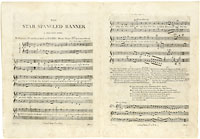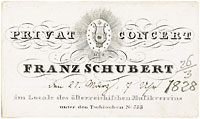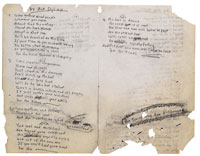America at Auction
A Patriotic Song
The Star Spangled Banner by Francis Scott Key, $506,500 at Christie’s New York on December 3.
What was much later (1931) to become America’s national anthem was inspired by events that took place on the night of September 13-14, 1814. Key, a young lawyer, had boarded a British ship under a flag of truce to try and secure the release of an imprisoned physician, Dr. William Beanes, but as the British were at the time bombarding Fort McHenry (Maryland), preparatory to a full-scale assault, Key was not allowed to leave until the morning and had to spend the night on the deck of the sloop on which he had arrived alongside.
From there he could see the Stars and Stripes flying bravely above the fort, but when the bombardment suddenly ceased and smoke then obscured the view, he feared the worst. Come the dawn, however, he once again saw the flag, and in a burst of patriotic fervor produced the lines that begin, “O say can you see, by the dawn’s early light,” and conclude with the words “the star-spangled banner in triumph shall wave o’er the land of the free, and the home of the brave.”
Enormously popular, Key’s verses were quickly set to the tune of a well-known drinking song by English composer John Stafford Smith. By November 18 of that year, Carr’s music store of Baltimore had produced the sheet music.
Bound in a album with forty-nine other pieces of popular music that once belonged to a Mary Barnitz of York, Pennsylvania, this was one of only eleven recorded copies of that first printing and the only one still in private hands. It remains, like all the others, in America, having been secured by an American collector.
For One Night Only–Schubert goes Public
A ticket for a Schubert concert, £25,000 ($38,915) at Sotheby’s London on December 1.
There were more expensive manuscripts by Mozart and Beethoven in this sale, but for me, and I suspect for many of those who share a love of Franz Schubert, one of the most appealing items would most certainly have been this engraved ticket to an 1828 concert given by the composer in Vienna. Although his musical evenings with his friends, the Schubertiads, are legendary, Schubert gave only one public concert in his tragically short life—and this would seem to be the only surviving ticket to that unique event.
The concert was originally planned and advertised for March 21, but due to the indisposition of the violinist, Ignaz Schuppanzigh, it had to be postponed for a few days. The original date and time of the concert have been filled in ink, and the revised date added in pencil.
Held at the Österreichischen Musikvereins, the concert included the first movement of a new string quartet (probably the not exactly new, but until then unperformed Quartet in G major, D887) and the Piano trio in E Flat, Op.100, as well as Ständchen, Die Allmacht and other songs.
Formerly in the collections of the concert pianist Rudolf Serkin (d. 1991), this rare ticket was bought by UK dealer Richard Linenthal for a client, with a Viennese institution the disappointed underbidder.
“Come Gather Round People”
Autograph Lyrics for “The Times They Are A-Changin’” by Bob Dylan, $422,500 at Sotheby’s New York on December 10.
Arguably Bob Dylan’s most famous song and one that has been called the quintessential protest song of the 1960s – though not by its author, who said there was no such term when he wrote the song and he did not intend it as such. The title track of Dylan’s third album, the song was first recorded and publicly performed at Carnegie Hall in October 1963.
That this smudged, creased, holed, and generally tatty autograph manuscript has survived is not due to its writer, who apparently had a devil-may-care attitude about his writings at the time. It survives as a result of the interest and forethought shown by Kevin Krown, a fellow folksinger who was perhaps his closest friend in his early days in New York, and by Mac and Eve MacKenzie, at whose 28th-Street apartment he frequently stayed in the early ’60s.










